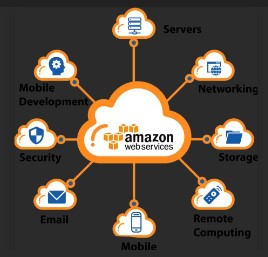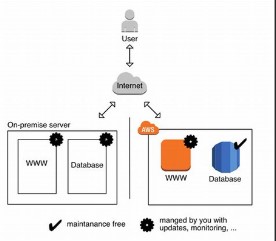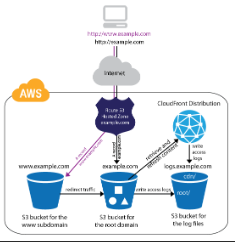Amazon Aws Cloud Hosting
Welcome to the World of AWS: Redefining Cloud Hosting
Discover how Amazon Web Services (AWS) is transforming the landscape of cloud hosting, offering unparalleled scalability and reliability.
Why Amazon AWS is the Premier Choice for Cloud Solutions
Explore why AWS has become the top choice for businesses worldwide, from startups to enterprises, for their cloud computing needs.
Understanding AWS Cloud Hosting
AWS Cloud Hosting represents a paradigm shift in how businesses manage their IT infrastructure. Unlike traditional on-premises solutions, AWS offers a scalable, flexible, and cost-effective cloud computing platform that has revolutionized the industry.
At its core, AWS Cloud Hosting provides a comprehensive suite of cloud services that cater to a wide range of business needs. This includes computing power, storage solutions, databases, networking, and specialized tools for analytics, machine learning, and IoT. Each service is designed to be highly reliable, secure, and capable of handling the dynamic demands of modern business environments.
AWS’s journey from an e-commerce giant’s internal tool to a global leader in cloud computing is marked by continuous innovation and customer-centricity. Initially developed to support Amazon.com’s rapid growth, AWS has evolved into a standalone business unit that serves millions of customers worldwide, ranging from startups to Fortune 500 companies.
AWS Cloud Hosting operates on a pay-as-you-go pricing model, which eliminates the need for upfront investments in hardware and allows businesses to scale their infrastructure based on demand.
This flexibility is further enhanced by AWS’s global reach, with data centers (called Availability Zones) located strategically around the world. This geographical diversity ensures low-latency access and high availability for applications and services deployed on AWS.
The platform’s robust security measures are another hallmark of AWS Cloud Hosting. AWS adheres to stringent security protocols, including encryption, network firewalls, and identity and access management (IAM) tools.
Compliance certifications such as HIPAA, GDPR, and SOC further validate AWS’s commitment to data protection and regulatory compliance, making it a trusted choice for industries with strict security requirements.
AWS’s ecosystem is supported by a vast network of partners, developers, and third-party integrators who contribute to its rich ecosystem of tools and services.
This ecosystem enables businesses to customize and extend AWS’s capabilities according to their specific needs, whether it’s building complex architectures, integrating with existing systems, or developing new applications using AWS’s extensive APIs and SDKs.
In essence, AWS Cloud Hosting empowers businesses to innovate faster, reduce time-to-market, and focus on core competencies without the burden of managing infrastructure.
By leveraging AWS’s scalable and reliable cloud services, organizations can drive digital transformation, achieve operational efficiency, and stay competitive in today’s rapidly evolving business landscape.
What is AWS Cloud Hosting? An Overview
AWS Cloud Hosting refers to the array of cloud computing services provided by Amazon, encompassing everything from storage to machine learning.
The Evolution of AWS: From E-Commerce Giant to Cloud Leader
Trace the journey of AWS from supporting Amazon.com’s infrastructure to becoming a dominant force in the global cloud computing industry.
Core Services Offered by AWS
Compute Power: EC2 Instances and Auto Scaling
AWS EC2 provides resizable compute capacity in the cloud, while Auto Scaling automatically adjusts resources based on demand.
Storage Solutions: S3, EBS, and Glacier
AWS S3 offers scalable object storage, EBS provides persistent block storage, and Glacier offers long-term archival storage at low costs.
Database Services: RDS, DynamoDB, and Redshift
AWS RDS manages relational databases, DynamoDB offers NoSQL database services, and Redshift provides data warehousing solutions.
Networking and Content Delivery: VPC, CloudFront, and Route 53
AWS Virtual Private Cloud (VPC) enables users to launch AWS resources into a virtual network, CloudFront accelerates content delivery, and Route 53 manages DNS and domain registration.
Advanced AWS Features
Machine Learning and AI: SageMaker and Rekognition
AWS SageMaker simplifies the process of building, training, and deploying machine learning models, while Rekognition provides image and video analysis.
Big Data Analytics: EMR and Redshift Spectrum
AWS EMR offers managed Hadoop and Spark clusters for big data processing, and Redshift Spectrum allows querying data directly from S3.
Internet of Things (IoT): IoT Core and Greengrass
AWS IoT Core connects devices to the cloud, enabling secure communication and management, while Greengrass extends AWS IoT to edge devices.
Benefits of Using AWS Cloud Hosting
Scalability: Grow Your Infrastructure Seamlessly
With AWS, scale resources up or down instantly based on demand, ensuring your infrastructure can handle fluctuations in workload.
Security: Industry-leading protection and Compliance
Benefit from AWS’s robust security measures, including encryption, identity and access management (IAM), and compliance certifications.
Cost Efficiency: Pay-As-You-Go Pricing Model
Utilize AWS’s flexible pricing model, paying only for the resources you use without upfront costs or long-term commitments.
Global Reach: Multiple Regions and Availability Zones
Access AWS services from multiple geographic regions worldwide, ensuring low latency and high availability for global deployments.
Getting Started with AWS
Setting Up Your AWS Account: A Step-by-Step Guide
Follow a detailed guide to creating and configuring your AWS account, including setting up billing and security settings.
Navigating the AWS Management Console: Tips and Tricks
Learn how to efficiently navigate the AWS Management Console to manage your AWS resources, configure services, and monitor performance.
Essential Tools for Beginners: AWS CLI and SDKs
Discover essential tools like AWS Command Line Interface (CLI) and Software Development Kits (SDKs) to automate tasks and integrate AWS services.
Case Studies: AWS Success Stories
Case Study 1: Netflix’s Global Streaming Platform
Explore how Netflix leverages AWS’s scalability and reliability to deliver seamless streaming experiences to millions of users worldwide.
Case Study 2: Airbnb’s Scalable Infrastructure
Learn how Airbnb uses AWS’s infrastructure to handle massive spikes in traffic and ensure a seamless booking experience for its global user base.
Case Study 3: NASA’s Data-Driven Mars Rover Missions
Discover how NASA utilizes AWS’s powerful computing and data storage capabilities to analyze mission data and drive scientific discoveries.
Best Practices for AWS Cloud Hosting
Optimizing Performance: Load Balancing and Auto Scaling
Implement load balancing and auto-scaling to optimize performance, ensuring your applications run smoothly under varying workloads.
Enhancing Security: Identity and Access Management (IAM)
Secure your AWS resources using IAM policies, roles, and multi-factor authentication (MFA) to control access and protect sensitive data.
Cost Management: Using AWS Budgets and Cost Explorer
Monitor and manage your AWS spending with tools like AWS Budgets and Cost Explorer, optimizing costs without sacrificing performance.
Common Challenges and How to Overcome Them
Managing Complex Architectures: Tools and Strategies
Utilize AWS CloudFormation and third-party tools to manage complex architectures, ensuring consistency and scalability across deployments.
Data Migration: Best Practices and AWS Migration Services
Plan and execute seamless data migrations to AWS using AWS Database Migration Service (DMS) and Snowball for large-scale data transfers.
Ensuring High Availability: Design Patterns and Services
Implement high availability using AWS services like Amazon Route 53 for DNS management and AWS Elastic Load Balancing for distributing traffic.
The Future of AWS Cloud Hosting
Upcoming Features and Innovations: What’s Next for AWS
Explore upcoming AWS features such as enhanced AI capabilities, serverless computing advancements, and deeper integration with emerging technologies.
The Role of AWS in Emerging Technologies: Blockchain, Quantum Computing, and More
Learn how AWS is pioneering new frontiers in technology, including blockchain solutions with AWS Blockchain Templates and quantum computing with AWS Quantum Ledger Database (QLDB).
How AWS is Shaping the Future of Cloud Computing
Discover AWS’s contributions to the evolution of cloud computing, driving innovation, and setting industry standards for reliability, scalability, and security.
Conclusion
Recap: The Unmatched Advantages of AWS Cloud Hosting
Summarize the key benefits of AWS, including scalability, security, cost efficiency, and global reach, that make it the preferred choice for businesses worldwide.
Final Thoughts: Embracing the Cloud with Confidence
Encourage businesses to embrace AWS cloud hosting as a transformative solution for their IT infrastructure needs, enabling growth and innovation.
Call to Action: Start Your AWS Cloud Journey Today
Invite readers to begin their AWS cloud journey, offering resources and guidance to get started and leverage AWS’s powerful capabilities for their business.





